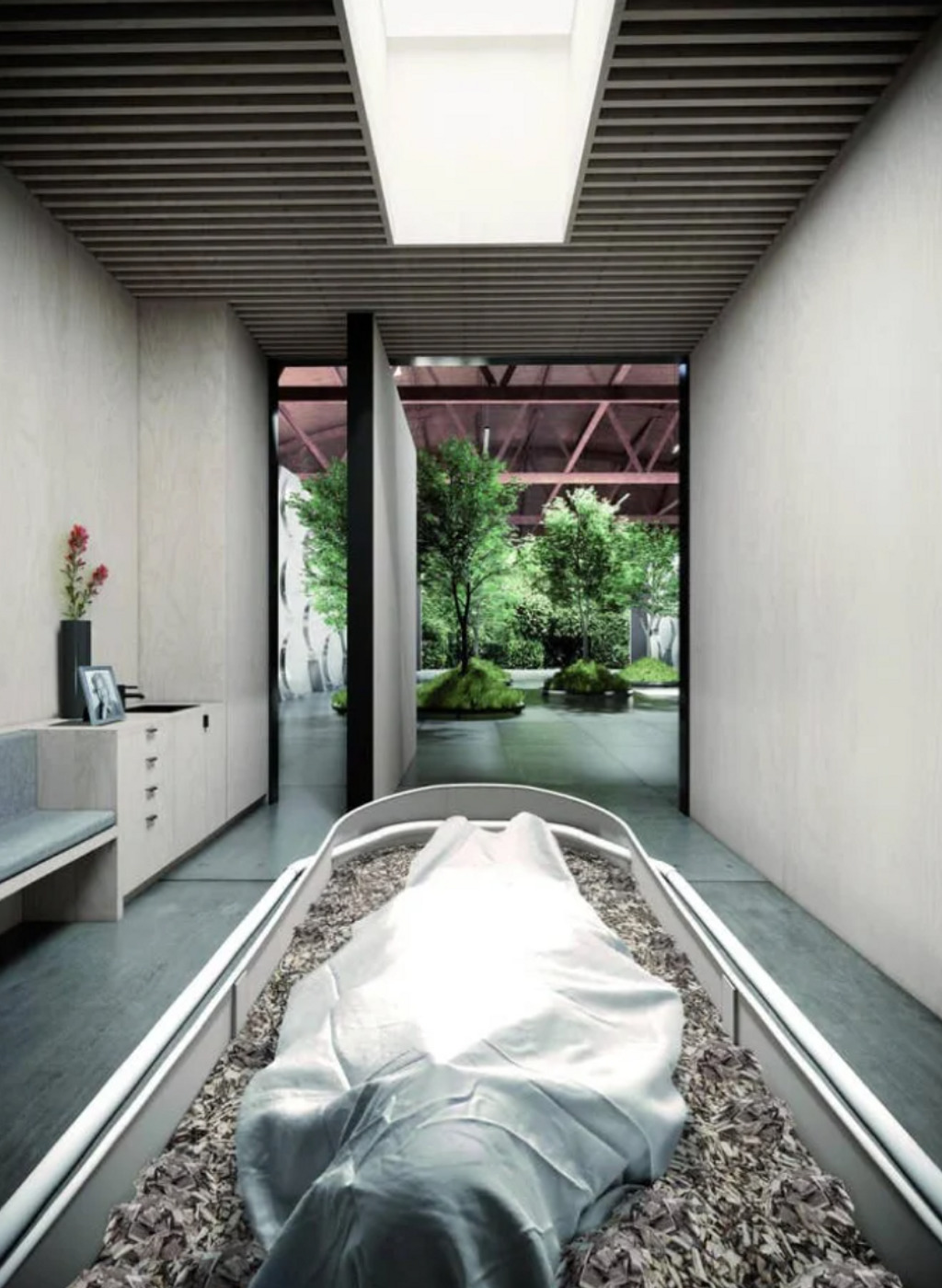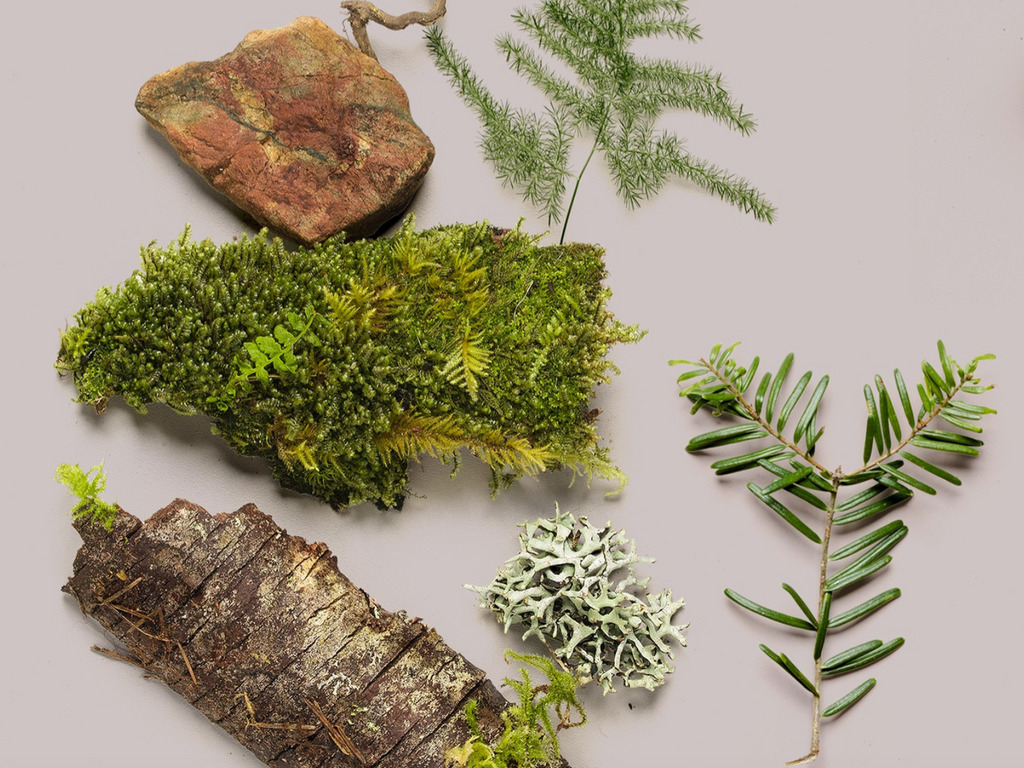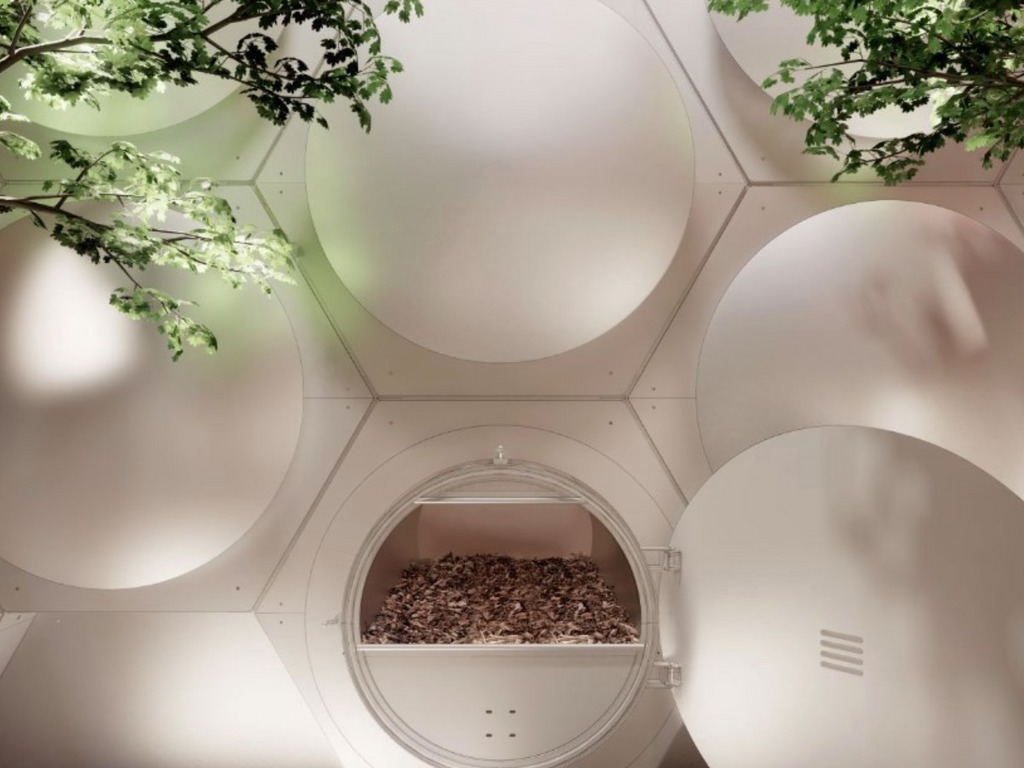6 Mins Read
While it’s not the most pleasant of subjects to discuss, most people may be surprised to learn that traditional burials are fairly toxic and harmful to the environment. As such, there has been an increase in individuals around the world looking for innovative ways to die in a manner that will be kinder to the planet. A new US company is looking to serve this market. As described here, Recompose is the first full-service human-composting funeral home, providing an ecological solution for your remains when you die which involves turning you into soil.
Recompose has opened its doors to the public with its first full-service human-composting funeral home that will convert people into soil, after almost a decade of research, planning and raising funds as well as a campaign to change state law.
Founded by Katrina Spade, the first bodies were laid in Recompose starting on December 20, 2020, after a 10-year extensive journey. An architecture student at the University of Massachusetts at Amherst, Spade first looked into funeral alternatives whilst enduring a minor mortality crisis of her own. Through her research, she found that when it came to traditional burials, options were extremely limited, and most were toxic and/or expensive. Cremations tend to be carbon-intensive, while rural green burials are rare and inconvenient for urban folks.
Spade went on to explore the method of composting as a kind of soil-based cremation, leading her to complete her master’s thesis on the subject. ‘Of Dirt and Decomposition: Proposing a Place for the Urban Dead’ was published in 2013.
This is a very controlled process, completely driven by microbes. It’s fueled by plant material and monitored in a very rigorous way
Katrina Spade, founder and CEO of Recompose
The Recompose process takes around 30 days, starting in a vessel that consists of wood chips and straw. After a few weeks, the process continues in ‘curing bins’, large boxes, one per individual, where the soil will rest and continue to exhale carbon dioxide. After the completion of this process, the family of the individual can either collect the soil or donate it to an ecological restoration project at Bells Mountain near Vancouver, Washington. So far, most families have chosen to donate the soil.

As Spade explains, each vessel is supervised for temperature and moisture content with the help of sensors that note temperature readings every 10 minutes. This ensures that the microbes inside are receiving what they require for safe and efficient composting along with rotating each vessel a few times during the process as all compost needs turning.
State regulations state that the soil must maintain a temperature of 131 degrees Fahrenheit for 72 hours that helps to safely cook away pathogens like fecal coliform and salmonella. The state also asked Recompose as well as a third party to test for those pathogens along with heavy metals, including arsenic, lead and mercury in the final soil. Furthermore, the state restricts people who have contracted certain diseases such as tuberculosis, prion infections like Creutzfeldt-Jakob disease, from undergoing natural organic reduction (NOR).
Spade adds that the process is entirely controlled. “It is also completely driven by microbes. It’s fueled by plant material and monitored in a very rigorous way.”
In the first couple of months of Recompose, Carpenter-Boggs, a soil scientist from WSU, was present to keep a watch on the soil along with guiding Spade and her team to care for the deceased. Sade mentioned that before each body is laid into its vessel, Carpenter-Boggs requests those present to take a moment and she then recites a poem by the 13th-century Sufi poet Rumi.
Another vital component of the process is the oxygen, with air being blown into each vessel via one set of tubes and through the other set, exhaust is released passing through carbon-activated filters.
Steve Van Slyke, compliance director for the Puget Sound Clean Air Agency mentioned that the emissions and odors from NOR are expected to be minimal with respect to other operations they review. These include cremations, demolitions of asbestos-filled buildings as well as marijuana cultivation. Recompose’s air permit does not show any visible emissions from the facility, nor detectable odors.
Carpenter-Boggs shared that her founder journey has involved a steep learning curve. “I don’t come from the funeral-care world at all and I’ve learned a lot over the past five or six years.”

At one point in January, eight deceased people were already inside the vessels with the process of NOR, in simple terms, human composting underway. The vessels contained remains from Ernest ‘Ernie’ Brooks II, an underwater photographer to organic-farming pioneer Robert ‘Amigo Bob’ Cantisano to Paulie Bontrager, a vegan, environmentalist, and nature lover from West Virginia who passed away while visiting her daughter.
Charlotte Bontrager, Paulie’s daughter, told the Seattle Times that she had come across a newspaper article regarding Recompose a couple of years ago. “I discussed it with my mom. We talked about how cool it was and why it took so long to get a service like this. I remember her saying: ‘If it’s at all possible when I die, I want to go that way.’ Longevity runs in my family, her uncle died a year ago at 104, and I said: ‘Oh mom, you’ll be around another 30 years. I’m sure it’ll be in place by then.”
Two years after this conversation, her mother was diagnosed with a previously undetected lung condition. At that time, Bontrager wasn’t thinking much about disposition choices until her mother passed. Bontrager then remembered the conversation they had and on research, discovered that Recompose was ready. “My mom was a very humble, loving person and would not want any kind of spotlight. But she’d be thrilled to know she was among this first group of pioneers.”
As I’ve learned more about Recompose, I’ve found it to be a very graceful and beautiful way to go. It’s the natural way, the way every living thing in history has eventually been cared for, from an apple core to a human — you’re not being burned up, not being pumped full of embalming chemicals and taking up space in a container. It seems like a peaceful way for the body to move on to the next phase
Charlotte Bontrager, Paulie’s daughter, one of the first deceased to undergo the Recompose process
To get Recompose to an operational stage, another significant challenge was to push for a change in state law allowing NOR to be a legal means of disposition for human remains and this turned out successful with Governor Jay Inslee signing off on it back in May 2019. The company also raised US$6.75 million in capital, enabling them to get started with their service.
Recompose charges an all-inclusive US$5,500 fee, which includes the body pickup service that is available in King, Pierce, and Snohomish counties, the paperwork, the process as well as body transport from further away can be arranged, for an extra fee, with Recompose accepting bodies from California and the East Coast.
Bontrager added that as she learned more about Recompose, she found it to be a very graceful and beautiful way to go. “It’s the natural way, the way every living thing in history has eventually been cared for, from an apple core to a human — you’re not being burned up, not being pumped full of embalming chemicals and taking up space in a container. It seems like a peaceful way for the body to move on to the next phase.”
In 2020, two other NOR competitors have come about: Herland Forest, natural-burial cemetery in Klickitat County with one vessel, also called cradle and Return Home, that is slated to open its Auburn facility in April.
With the emergence of these NOR funeral homes, more and more individuals now have the option to opt for a peaceful ecological burial that will help the planet and even in death make sure that they don’t unnecessarily contribute to climate change. Let’s hope human remains composting becomes more mainstream and more such burial centres open across the globe.
Lead image courtesy of Recompose.



